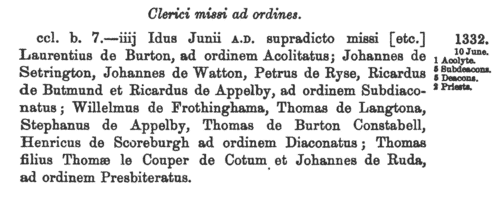Skirlaw Surname Ancestry ResultsOur indexes 1000-1999 include entries for the spelling 'skirlaw'. In the period you have requested, we have the following 3 records (displaying 1 to 3):
Buy all | |
| Get all 3 records to view, to save and print for £14.00 |
These sample scans are from the original record. You will get scans of the full pages or articles where the surname you searched for has been found.
Your web browser may prevent the sample windows from opening; in this case please change your browser settings to allow pop-up windows from this site.
Clergy at Beverley Minster
(1322-1347)
The minster (collegiate church) of St John of Beverley in Yorkshire was an important foundation with extensive ecclesiastical and temporal rights exercised by the chapter. The main register of the administration in both respects was the chapter act book, and this edition of the act book from 2 February 1322 to 19 November 1347 was edited by Arthur Francis Leach for the Surtees Society and published in 1903. The act book material occupies pages 1 to 136; to this were added extracts relating to Beverley from the registers of the Archbishops of York from 1279 to 1381; miscellaneous documents from York Minster manuscripts and the British Museum from 1135 to 1314; and a copy of the Beverley Provost's Book, compiled in 1417, but with material from the preceding centuries. All these sources are covered by this index: but the bulk of the personal references are from the chapter act book, and relate to clergy at or connected with Beverley.SKIRLAW. Cost: £4.00.  | Sample scan, click to enlarge

|
Yorkshire Testators and Legatees
(1484-1508)
Wills and testaments from the diocese of York (Yorkshire, Nottinghamshire, Hexhamshire, Lancashire north of the Ribble, and southwest Westmorland) registered at York. Richmond and Southwell archdeaconries had their own lower probate jurisdictions, so the wills registered at York are predominantly from the East and West Ridings and the eastern part of the North Riding of Yorkshire. In theory, wills dealt with real property and testaments with personal property, but the distinction hardly applies in practice: most of these wills are in Latin, but some are in English. Being before the Reformation, they commonly start with benefactions to churches, chantries, chapels, &c., and with provisions for the burning of candles ('lights') and saying of masses. This publication in 1869 by the Surtees Society as Testamenta Eboracensia iv is an edition by James Raine of selected wills from the period. Some additional material is included from the Prerogative Court of Canterbury and the York Dean and Chapter archives.SKIRLAW. Cost: £4.00.  | Sample scan, click to enlarge

|
Tenants, founders and incumbents of Yorkshire chantries
(1546-1548)
Chantries were established to perform services for the souls of their founders and other faithful dead, including annual obits and anniversaries at which alms were usually distributed. The chantries could be at an existing altar in a parish church, a new altar in a side chapel of an existing church, in a new chapel in the churchyard or some miles from an existing church: few were founded before 1300, and most date from 1450 to 1500. Hospitals were places provided by similar foundations to receive the poor and weak; there were also religious guilds, brotherhoods and fraternities, and colleges (like large chantries at which three or more secular priests lived in common). An Act of Parliament of 1545 gave king Henry VIII the power to dissolve such chantries, chapels, &c., the proceeds to be devoted to the expenses of the wars in France and Scotland. Commissioners were appointed 14 February 1546 to survey the chantries and seize their property, and from 1546 to 1548 the commissioners produced these certificates giving brief details of the establishment and nature of each foundation, with an inventory of valuables and rental of lands. The individuals named in the certificates are thus the founder, the present incumbent, and the tenants whose rents provided the chantry's income. All the surviving certificates were edited by William Page for the Surtees Society, and published from 1892.SKIRLAW. Cost: £6.00.  | Sample scan, click to enlarge

|
Research your ancestry, family history, genealogy and one-name study by direct access to original records and archives indexed by surname.





